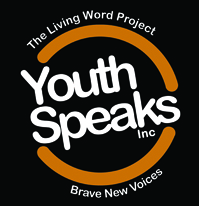 I’m probably going to make myself very unpopular with this blog post. For what kind of cold-hearted arts critic would say anything negative about Youth Speaks, one of the the leading (if not the leading) nonprofit presenter of teen-oriented spoken word performance, education, and youth development programs in the country?
I’m probably going to make myself very unpopular with this blog post. For what kind of cold-hearted arts critic would say anything negative about Youth Speaks, one of the the leading (if not the leading) nonprofit presenter of teen-oriented spoken word performance, education, and youth development programs in the country?
Founded in the Bay Area in 1996, Youth Speaks has done an amazing job of reaching out to young people and helping them to channel their thoughts and beliefs into text, which the youngsters (mostly teens) can share aloud at various Youth Speaks events like poetry slams and youth poetry festivals. The organization has achieved considerable fame around the US. According to the Youth Speaks website, it works with 45,000 teens per year in the Bay Area alone, and has created partner programs in 36 cities across the country.
I’ve heard Youth Speaks poets on several occasions at various events around San Francisco, Berkeley and Oakland. I’ve always been impressed by the poets’ level of commitment, passion and confidence. Every now and again, I even hear amazing poetry delivered so powerfully that the words cut right to the core.
But at the organization’s annual Martin Luther King celebration in San Francisco on Monday, where I was able to watch and listen to many Youth Speaks poets one after another, I found myself less caught up in the performers’ rabble rousing enthusiasm than I was by their lack of basic delivery skills.
An assortment of young poets, some of them with more highly developed artistic abilities than others, got up to share their work. What mostly got in the way of my engagement with the event was the fact that half of the time, I couldn’t make out what the speakers were saying. Some of them spoke too fast, while others managed to mumble, even though they were miked. Also, I’m fine with young poets using the stage as therapy if they feel the need — at least a few performers gave tortured diatribes on being abused by their parents as children.
But whatever kind of poem you put out there in the world, if you’re going to put it in front of people, it should be a real performance i.e. learn the poem from memory. Standing on stage staring at a sheet of paper and stumbling over words is not my idea of performance poetry. The Youth Speaks mentors and instructors should insist that the poets learn their work by heart and pay more attention to the performative aspects of live poetry. After all, even if some of the speakers consider what they’re doing to be therapy, the people out there in the audience are usually looking to be entertained.
